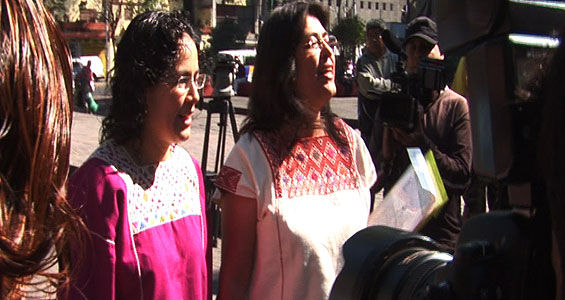Anger at Mexico’s gay marriage law
Activists hail law allowing gay unions in capital but others fight to have it overturned.

 |
| Lolkin Castaneda, left, and Judith Vazquez have welcomed the new gay marriage law |
A new law, considered by some to be a landmark decision, which has given Mexico City’s gay community the right to marry, has angered the country’s ruling political party.
Since the leftist government of Mexico City voted in the law in December, it has proved divisive, with the nation’s ruling political party, PAN, heading the opposition.
Mariana Gomez del Campo, PAN’s co-ordinator in the national legislative assembly, says marriage should be reserved exclusively for heterosexual couples.
“It’s an institution for a man and woman, for mutual help and procreation; those are the two reasons to marry, that’s what our laws say and our constitution.”
The fact that the law will give gay couples all the legal benefits that heterosexual couples enjoy and the right to adopt children has proved particularly controversial.
The Catholic church has entered the fray, with Norberto Rivera, a leading Mexican cleric, arguing that the law violates the rights of children.
“The government should be the first to respect the need for children to have a father and a mother,” he says.
The official Catholic newspaper of Mexico City, Desde La Fe or From the Faith, calls the law “immoral, unacceptable and reprehensible”.
Jose Martín Rabago, the archbishop of the central state of Leon, goes further, questioning whether recent natural disasters in the country are a divine response to “legal initiatives which affect the base of society; the family”.
Challenged in court
|
“It’s an institution for a man and woman for mutual help and procreation, those are the two reasons to marry, that’s what our laws say and our constitution.” Mariana Gomez del Campo, PAN politician |
Even the federal attorney-general has launched a legal counterattack against the law, citing an article in the constitution that makes reference to “protecting the family”.
The Supreme Court is still reviewing this challenge which, if successful, could overturn the measure.
Many gay activists are unsurprised by the strong reaction from these powerful institutions, saying that Mexico remains a society in which homophobia is prevalent.
The capital is noticeably one of the more liberal, cosmopolitan areas, in which gay couples walk down the main avenue, Paseo Reforma, hand-in-hand and areas such as Zona Rosa are famous for gay cafés and bars.
Now the battle seems to be for the rest of the country, where the law does not apply.
Some gay couples from other states plan to travel to Mexico City to marry and then return to their homes and attempt to force the state authorities to recognise their union.
Others are pushing directly for the law to be expanded to other states.
Twenty-two gay couples celebrated a symbolic marriage ceremony in Tlaxcala on February 26 to highlight the issue.
Wedding preparations
In the meantime, Judith Vazquez and Lolkin Castaneda are preparing for their wedding.
 |
| The Mexico City law allows gay couples to adopt children together |
The two academics and gay rights activists have been living together for six years and are now enjoying a landmark decision that has given them rights equal to those of heterosexuals.
They will be able to open a joint bank account, inherit property from each other and adopt children together.
Judith believes that it is a defining moment.
“It is a triumph for those of us who believe that society and the world can change, for those that have the certainty that things can be different tomorrow, if you get involved. It’s a huge step forward,” she says.
For some, it is a step too far.
Conservative states
Their opponents will be equally determined to prevent the Mexico City law from spreading.
The conservative states of Jalisco, Baja California, Sonora, Guanajuato, Morelos and Tlaxcala have already had constitutional challenges against the Mexico City law rejected by the Supreme Court.
They would put up stiff resistance to it moving outside of the capital.
When the first couples in Mexico marry in the middle of March, Vazquez and Castaneda will be among those tying the knot.
It is part of a growing trend in Latin America which saw the first gay wedding in Argentina at the end of December and gay couples in Uruguay granted the right of adoption in September.
For Judith and Lolkin, it is the end of a long struggle to be recognised as a married couple.